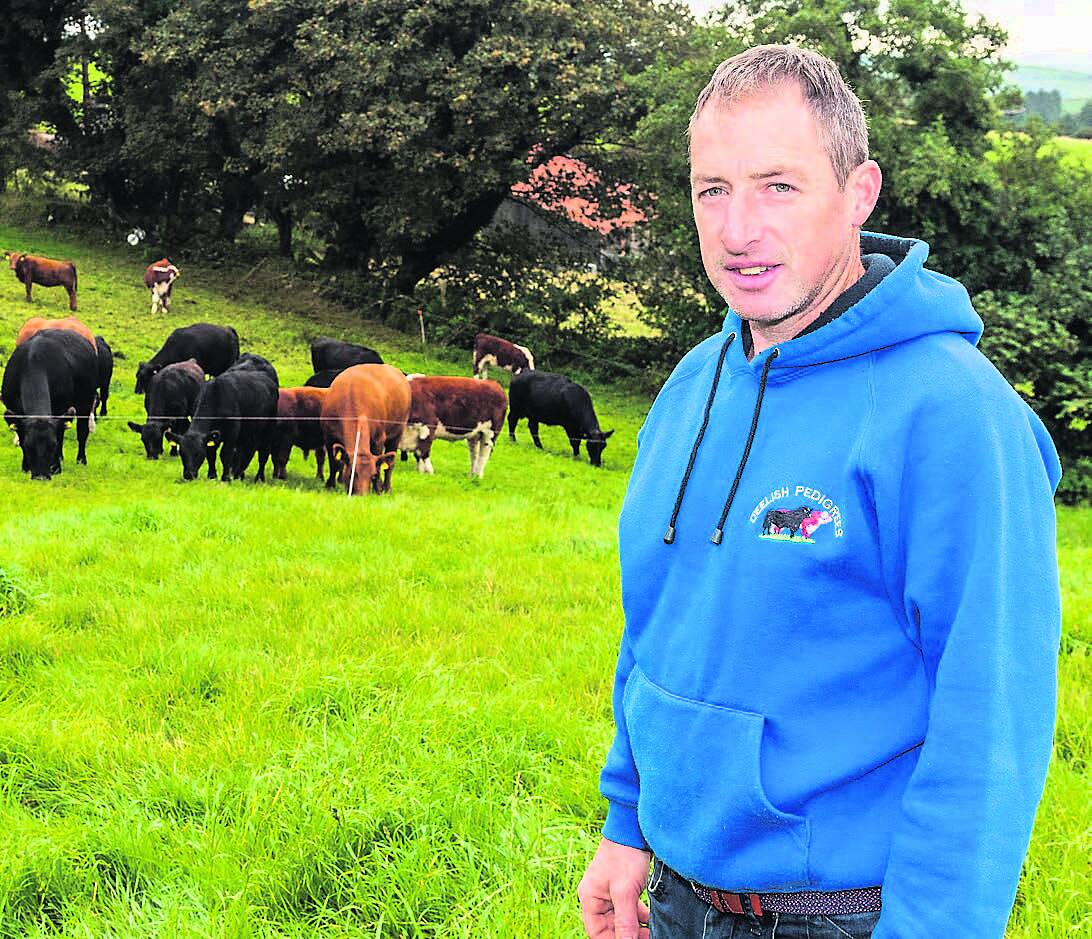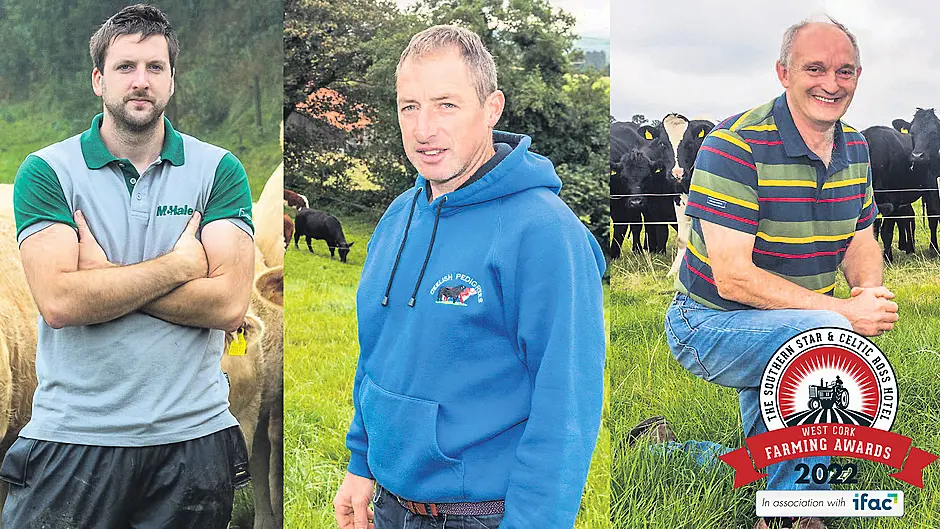WEST Cork is known for its rich dairy heritage, however the region also boasts some of the country’s finest drystock farmers.
And this week we’re delighted to reveal three of them who are the finalists in our Drystock Farmer of the Year category in our West Cork Farming Awards.
They are Michael Dullea, Drimoleague; Micheál Coughlan, Union Hall and Albert Helen, Ballinascarthy.
The award invited entries from farmers who produce quality beef and lamb. Entries from specialist enterprises such as pig and poultry farmers were also welcome under this category.
The ultimate winner, judges say, will recog- nise and acknowledge farmers who demon- strate key practices and innovations to enhance quality and farm profitability, and our three finalists tick all the boxes.
Next week we’ll reveal more about one of the most anticipated awards, a new addition this year, and that’s the Farming Family.
That will just leave the prestigious Hall of Fame to be announced ahead of the awards ceremony which is set to take place on October 7th.
All finalists, together with their families, are invited to a gala awards ceremony at the Celtic Ross Hotel, Rosscarbery on the day for what is a fantastic annual celebration of West Cork farming.
DRYSTOCK FARMER OF THE YEAR FINALISTS - Sponsored by Bank of Ireland

Michael Dullea | Drimoleague
MICHAEL Dullea farms a herd of pedi- gree angus and pedigree hereford cattle in Deelish, Drimoleague.
It’s a third generation farm. His grand- parents Patrick and Mary Ellen Dullea started out in the 1920s, followed by his parents Mickey and Betty.
Michael took over in 2010 having run his own tiling business for 12 years.
At the helm, he embarked on a major upgrade of the farm: investing in new cattle housing, land reclamation and reseeding and paddock fencing the full farm.
Cattle breeding and genetics have always been a huge interest to him, and he does all his own AI.
‘I use 100% AI on all the females so I can select the best possible genetics from around the world. My sire selection is based around back pedigree, appearance, ease of calving and they must have a really good set of indexes throughout.
‘My strategy on cow type is also simple she has to be fertile, quite easily fleshed and rears a really good calf, up to 60% of her own body weight at weaning.’
He sells pedigree angus and hereford bulls to mainly dairy farmers, pedigree breeders and also commercial suckler farmers.
‘The breed really have come into their own over the last number of years and are in huge demand. The dairy farmer sees the benefits through ease of calving, short gestation with the calves making a premium price afterwards,’ he explained.
His herefords are also regular winners on the national show circuit taking numerous All Irelands and championships around the country.
‘Selling four bulls to AI companies over the last four years has also given me a confidence boost with regards the breeding choices I make.’
He farms with the help of his children Jamie (12) and Emily (14) and his wife Sinead, a nurse in Bantry Hospital.
And he’s confident for the future, and knows changes have to be made: ‘ I think the angus and hereford breed will lead from the front when showing what the breeds can bring to the table to help lower our emissions in agriculture. This already has been proved in trials that have been done on demonstration farms in Ireland.
‘My aspirations for my farm and my herd is to continue to develop the herd based on livestock weighing and recording, gestation length and birth weight of calfs born. I will also continue to source the best genetics available to increase the genetic merit of my herd.’
He loves what he does: ‘From sourcing different sires from around the world to doing my own artificial insemination and then seeing the new life born from this. There is nothing I enjoy more than seeing new baby calves being born and walking through my cattle and watching youngstock develop into the next gen- eration of breeders.’
In his spare time he enjoys running, helping out with his local football club and spending time with his family and his dogs.

Albert Helen | Ballinascarthy
FARMING full time since he was 16, Albert Helen has always displayed remarkable agility and flexibility.
This ability to diversify and respond to different circumstances at different times has made him the successful farmer he is today.
‘When I was left school, and started farming full time at 16, we decided to fo- cus on dairy as our primary enterprise,’ said Albert.
This was in the late 70s. But by the time they had built the milking parlour, cubicles, and started to expand the dairy herd, milk quotas had been introduced.
‘By 1980 we had built up to 38 cows and had a 42,000 gallon quota but that was as far as we could go,’ he said.
He had to look to other enterprises and with tillage in his DNA – his father used to do baling on hire during the summer – he started to grow sugar beet.
‘We also reared beef cattle alongside the dairy herd. We continued all three enterprises until the closure of the sugar factory,’ he said.
That unfortunate set back, was fol- lowed by another challenge in the early 2000s when Albert was diagnosed with a chronic rheumatological condition.
He lives with the condition but it made the constant physical demands of running a dairy herd too much for him to continue.
He sold the herd in 2013 and went into dairy beef.
He does dairy calf to beef, buying the calves, usually hereford and angus cross. ‘We buy in 60 every year and top up with a few weanlings, and sell from 21-24 months,’ he said.
Interestingly, the Ballinascarthy farm is self-sufficient in terms of growing all its own feed.
‘We grew 80 tonnes of barley last year, using 35 ourselves and selling the rest. We grew 250 tonnes of beet, using half ourselves and selling the rest to a neighbour. We only need to buy in nine tonnes of barley balancer ourselves,’ he said.
Soil fertility, and grass management is an area they have made significant gains in.
‘We have included clover in every grass field. We use a Low Emission Slurry Spreader and have introduced a cover crop in the barley stubbles,’ he said.
Herd management, and herd genetics is another key area for Albert.
‘We were in the Beam scheme and reduced out bovine manure nitrogen by 5%. We buy all our calves privately from two local herds which helps control disease.
‘We aim for cross bred calves, from high euro star rated cows, and bulls, in order to achieve early finishing.’
The farm has been in the family for at least seven generations and that legacy is very important to Albert.
Married to Barbara, they’re parents of four: Edel (34); John (32); Clive (30) and Naomi (28).
‘I made a living full-time farming and continue to do so, and I hope future generations of my family will be able to do the same,’ he said.

Micheál Coughlan | Union Hall
AS an agricultural contractor as well as a full-time farmer, Micheál Coughlan has a good sense of what’s happening on the farming scene locally.
And that’s why the 29-year-old Un- ion Hall man is full of confidence for the future of agriculture.
‘Naturally, through our work we’re on a lot of farms in the region, and I’ve seen some brilliant work going on lately,’ he said.
That includes great strides being made to reduce fertiliser usage, re- seeding, planting of clover, and usage of LESS.
‘West Cork definitely has some of the best farmers in the country, and in my opinion a lot of them aren’t getting the credit they deserve for what they’re doing,’ he said.
Micheál has been farming all his life and went into a formal partnership with his father Michael in 2016 after completing his studies at Darrara College.
‘In 2019, we switched from a suckler to weanling system, to a suckler to finishing system with the aim of finishing young bulls and heifers,’ he explained.
To take that step up, they made a significant investment in a slatted house, which as well as allowing them to finish cattle, also meant they could expand numbers from 40-60.
‘We now run a 60 cow herd of mainly charolais crossbred cows with limousin, simmental and saler mixed in,’ said Micheál.
The herd is split in half with 30 autumn calving and 30 spring calving. ‘Our ultimate aim is to produce an easily finished animal with good confirmation and carcass weight. Being docile is key for replacement heifers as well,’ he said.
They focus on two areas mainly on the farm: ‘All bulls are finished as under 16 month bulls giving grades of U= to E-and with a kill out of up to 63%, and a carcass weight of 420kg plus.
‘Secondly, heifers not kept for replacement are finished at 20-24 months, giving grades of R+ to U+ with kill out of up to 53-60%.’
Genetics are important on the third generation farm with all replacements AI bred.
‘And all cattle for finishing are bred from our own two charolais stock bulls and AI,’ he said.
As a young man with two full-time jobs he’s aware of keeping an eye on work-life balance – when he can!
Instead of growing cow numbers, the focus is to fine tune what they’re doing, and to improve all the time.
‘The idea is to be economically sustainable – to finish animals fast, to have less inputs and more outputs. That’s what drives us rather than increasing our numbers.’
Focus this year on the farm has been to reduce fertiliser use, by better use of slurry using LESS methods and improved grassland management.
‘We’re reseeding all the time and stitching in clover.
‘Young grass makes for better animals and that’s what we’re always working towards.’
Why we support West Cork farming
RECOGNISING the challenging environment facing farmers, Bank of Ireland launched a €100m Agri Assist loan fund, to support farmers dealing with the rapidly increasing cost of farm inputs such as feed and fertilisers.
The fund which is open until the end of November, provides additional working capital to farmers at competitive rates with extended repayment terms of up to three years.
With the price of fertiliser tripling over the course of the last year in tandem with feed prices doubling, the Agri Assist loan fund is now open to farmers looking to better
manage their farms through a period of high input price ofIreland. inflation and ongoing supply pressures.
A key feature of the Agri Assist loan is that farmers can avail of additional working capital for their farm at a competitive rate with extended repayment terms of up to three years.
With Bank of Ireland’s support farmers can also now apply to the Agri Assist Loan Fund to:
• Finance the cost of growing grass, silage and tillage crops
• Provide funding to pay merchant or co-op bills for feed or fertiliser
• Avail of loans up to €100,000 under a discounted rate
• Set suitable loan terms ranging from six months to three years depending on need.
Bank of Ireland with its dedicated agri support team will continue to keep the situation on farms under constant review, working with farmers as they enter into the costly winter season.
Máire McCarthy, cluster manager with Bank of Ireland said: ‘We are delighted and honoured to be involved in these prestigious awards for a number of years now. Bank of Ireland is committed to the agri sector nationally and especially here in West Cork.
'We look forward to continuing to work with the farming community, seen as a being a fundamental industry in West Cork.’
Drystock Farmer of the Year is sponsored by Bank of Ireland.








